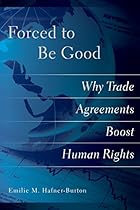Read Forced to Be Good: Why Trade Agreements Boost Human Rights by Emilie M. Hafner-Burton Online
* Forced to Be Good: Why Trade Agreements Boost Human Rights ↠ PDF Download by # Emilie M. Hafner-Burton eBook or Kindle ePUB Online free. Forced to Be Good: Why Trade Agreements Boost Human Rights In Forced to Be Good, Emilie M. Otherwise, demands by moral advocates are tossed aside. In addition to addressing economic issues, these agreements also regulate the protection of human rights. The United States has signed trade agreements with almost two dozen countries as close as Mexico and Canada and as distant as Morocco and Australia. Efforts by human rights advocates and labor unions to spread human rights ideals, for example, do not explain why American and European governments

| Title | : | Forced to Be Good: Why Trade Agreements Boost Human Rights |
| Author | : | |
| Rating | : | 4.45 (777 Votes) |
| Asin | : | 0801479258 |
| Format Type | : | paperback |
| Number of Pages | : | 240 Pages |
| Publish Date | : | 2015-12-03 |
| Language | : | English |
Her book poses a key challenge to the conventional wisdom on how norms of justice spread, and it will be of substantial interest to scholars and policymakers alike."Edward D. Despite mixed (at best) motivations, some of these agreements nevertheless made a positive contribution to improving human rights. "Forced to Be Good is fascinating and important. Mansfield, Hum Rosen Professor of Political Science, University of Pennsylvania "In this book, Emilie Hafner-Burton shows convincingly that old-fashioned, interest-based political bargaining, not a moral impulse to improve the world, led to human rights being included in recent U.S. Emilie M. She shows that a shift in institutional politics within the United States and the European Union made it impossible for political executives to negotiate trade deals as they had in the p
"Forced to be Good" according to Anonymous. Preferential trade agreements have become common ways to protect or restrict access to national markets in products and services. The United States has signed trade agreements with almost two dozen countries as close as Mexico and Canada and as distant as Morocco and Australia. The European Union has done the same. In addition to addressing economic issues, these agreements also regulate the pr
Hafner-Burton is Professor at the School of International Relations and Pacific Studies and the Department of Political Science and director of the Laboratory on International Law and Regulation at the University of California, San Diego.. Emilie M
In Forced to Be Good, Emilie M. Otherwise, demands by moral advocates are tossed aside. In addition to addressing economic issues, these agreements also regulate the protection of human rights. The United States has signed trade agreements with almost two dozen countries as close as Mexico and Canada and as distant as Morocco and Australia. Efforts by human rights advocates and labor unions to spread human rights ideals, for example, do not explain why American and European governments employ preferential trade agreements to protect human rights. Preferential trade agreements have become common ways to pro
Download Forced to Be Good: Why Trade Agreements Boost Human Rights
Download as PDF : Click Here
Download as DOC : Click Here
Download as RTF : Click Here
